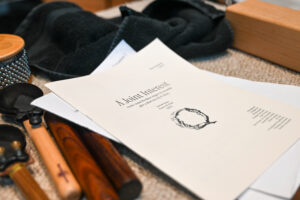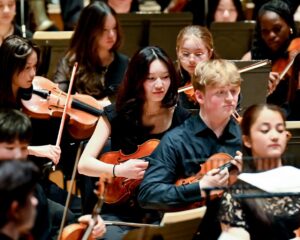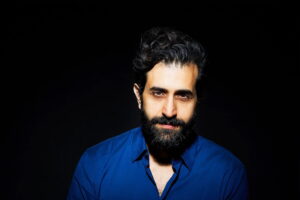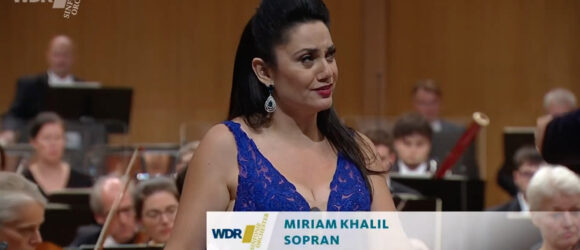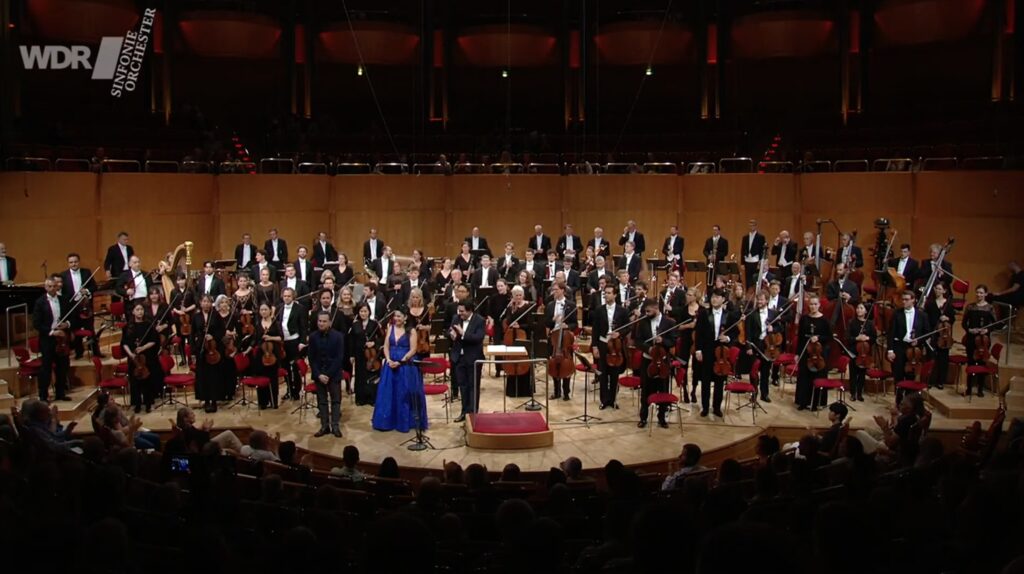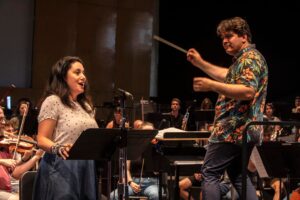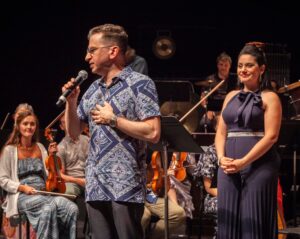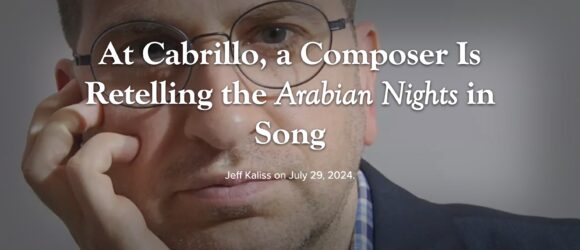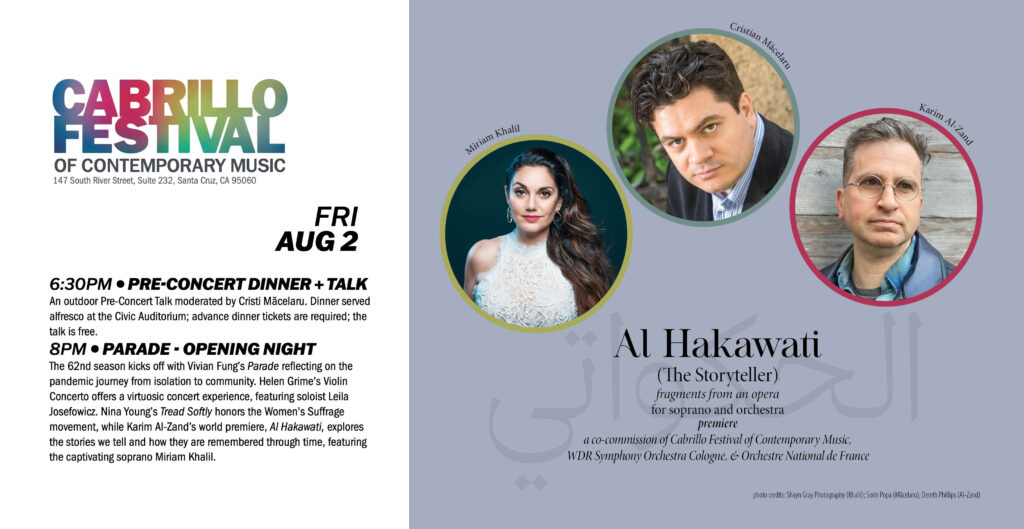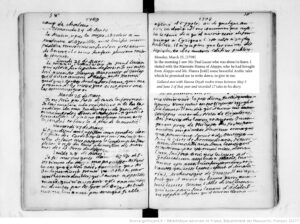A Joint Interest premiere for Shepherd School’s 50th Anniversary
- On January 26, 2026
- By alzand@rice.edu
- In EVENTS, News, Performances
 0
0
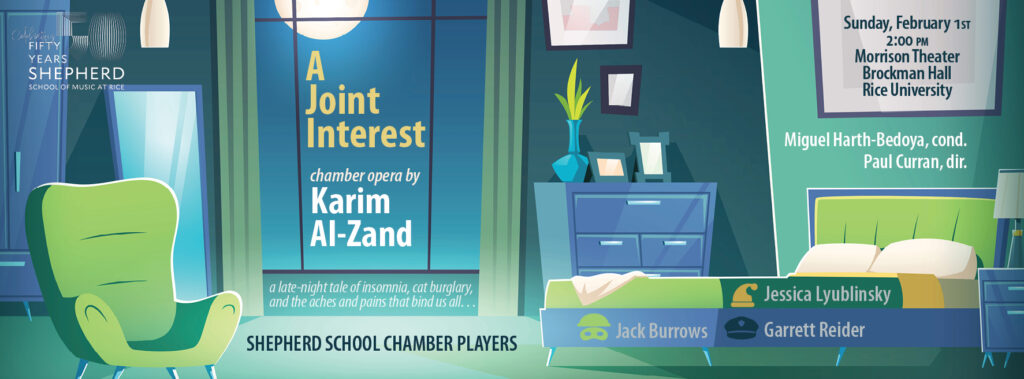 The chamber opera A Joint Interest was commissioned by the Shepherd School of Music (with funding assistance from Rice University Office of Research) on the celebratory occasion of the school’s 50th anniversary. Its premiere performance on Sunday, February 1st, 2pm will take place in the Morrison Theater of Brockman Hall at Rice University.
The chamber opera A Joint Interest was commissioned by the Shepherd School of Music (with funding assistance from Rice University Office of Research) on the celebratory occasion of the school’s 50th anniversary. Its premiere performance on Sunday, February 1st, 2pm will take place in the Morrison Theater of Brockman Hall at Rice University.
Two Songs published by Subito Music
- On January 09, 2026
- By alzand@rice.edu
- In News
 0
0
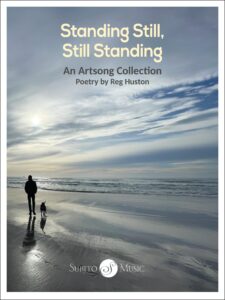 Two Songs, for voice and piano, has just been published by Subito Music in an artsong collection entitled Standing Still, Still Standing. The songs were commissioned during the pandemic by Mezzo-Soprano Susanne Mentzer, on poetry by performer, poet, and philanthropist Reg Huston. The volume also includes songs of Stephen Bachicha, Michael Ching, Kurt Erikson, Daron Hagen, Jason Hainsworth, Tammy L. Hall, Jake Heggie, Libby Larsen, Andre Myers, Richard Pearson Thomas, and Hilary Purrington.
Two Songs, for voice and piano, has just been published by Subito Music in an artsong collection entitled Standing Still, Still Standing. The songs were commissioned during the pandemic by Mezzo-Soprano Susanne Mentzer, on poetry by performer, poet, and philanthropist Reg Huston. The volume also includes songs of Stephen Bachicha, Michael Ching, Kurt Erikson, Daron Hagen, Jason Hainsworth, Tammy L. Hall, Jake Heggie, Libby Larsen, Andre Myers, Richard Pearson Thomas, and Hilary Purrington.
National Youth Orchestra of Great Britain performs City Scenes
- On January 06, 2026
- By alzand@rice.edu
- In EVENTS, News, Performances, Reviews/Press
 0
0
The National Youth Orchestra of Great Britain, under conductor Alexandre Bloch, kicked off their Shimmer tour—a program which includes City Scenes—with a performance at the Barbican Center on January 5th. Concerts in Warwick Centre (January 6) and Nottingham Royal Concert Hall (January 7th) will follow. Reviewers from The Guardian, Times and Telegraph tripped over themselves to compare the music to dead composers they have ready notions about (America + Orchestra + Jazz = Bernstein!). UPDATE more reviews: reviewsgate.com and A Young(ish) Perspective. PLUS three, more reviews.
“The Bernstein-brash, neon blare of Karim Al-Zand’s 2006 City Scenes introduced new swagger, a cheeky little phrase hopping around the orchestra like a sonic Artful Dodger, and strings and harps a gleaming foil to streetwise brass and woodwind.”
The Guardian
“…urban, Bernstein-ish sound of City Scenes, by Tunisian-born American composer Karim Al-Zand was a breeze, and the delicately “wrong-note” solos from a handful of violins in the dreamy slow movement had a deliciously louche quality.”
The Telegraph
…with plenty of chewy textures for the players — and some nifty solo work slickly delivered by the orchestra’s leader Aki Blendis — and driven rhythms that have a hint of Shostakovich, but a Shostakovich who has been airlifted from Moscow and taken to Miami for a weekend.
The Times of London
City Scenes performed by National Youth Orchestra of the UK
- On December 27, 2025
- By alzand@rice.edu
- In EVENTS, News, Performances
 0
0
The National Youth Orchestra of Great Britain, under conductor Alexandre Bloch, will perform City Scenes as part of their Shimmer program, in three New Year London concerts: Barbican Centre (January 5), Warwick Centre (January 6) and Nottingham Royal Concert Hall (January 7th).
2025/2026 Season Premieres
- On August 31, 2025
- By alzand@rice.edu
- In EVENTS, News
 0
0
The 2025-2026 season will feature the world premiere of two major new works: The Strangers’ Case, an extended song cycle for tenor and string orchestra and A Joint Interest, a comic chamber opera for three singers and ensemble.
The Strangers’ Case, written for Grammy Award winning tenor Karim Sulayman, will be performed in Houston on March 28th, as a co-presentation of the dynamic conductorless string orchestra Kinetic and pioneering new music presenters Musiqa. A performance in Boston’s Jordan Hall on May 9th by Grammy-Nominated ensemble A Far Cry will follow.
Subtitled <songs and chronicles of the immigrant experience>, The Strangers’ Case gathers together poems, personal accounts and other literary sources from newcomers to the United States. Drawing on texts from a variety of cultures, voices and time periods, it paints a layered emotional narrative of our complicated history with “strangers” to our shores. Its title is borrowed from Shakespeare’s monologue for Thomas More, which eloquently argues for empathy and compassion towards displaced people. Several of its texts are taken from a unique 1906 publication entitled Life Stories of Undistinguished Americans as Told By Themselves, a series of personal, turn-of-the-century accounts by immigrants to the United States: “Lady in the Harbor” is the story of a young Polish girl destined for the textile sweatshops, and “Such an Illumination” is from a Syrian refugee fleeing persecution in his homeland. “Island of Angels” excerpts lines written in the wake of the 1882 Asian Exclusion Act. This anonymous poem,
Several of its texts are taken from a unique 1906 publication entitled Life Stories of Undistinguished Americans as Told By Themselves, a series of personal, turn-of-the-century accounts by immigrants to the United States: “Lady in the Harbor” is the story of a young Polish girl destined for the textile sweatshops, and “Such an Illumination” is from a Syrian refugee fleeing persecution in his homeland. “Island of Angels” excerpts lines written in the wake of the 1882 Asian Exclusion Act. This anonymous poem,  translated from the Chinese, was found inscribed on the wooden walls of a San Francisco Bay immigrant detention facility. The cycle also includes a remarkable and prescient 1908 poem by Arthur Upson, “The Statue of Liberty (New York Harbor, A.D. 2900)” that imagines the New York harbor of the far future: the Statue of Liberty is unearthed, sunken in the mire, discovered by a “tyrant who misrules our land.”
translated from the Chinese, was found inscribed on the wooden walls of a San Francisco Bay immigrant detention facility. The cycle also includes a remarkable and prescient 1908 poem by Arthur Upson, “The Statue of Liberty (New York Harbor, A.D. 2900)” that imagines the New York harbor of the far future: the Statue of Liberty is unearthed, sunken in the mire, discovered by a “tyrant who misrules our land.”
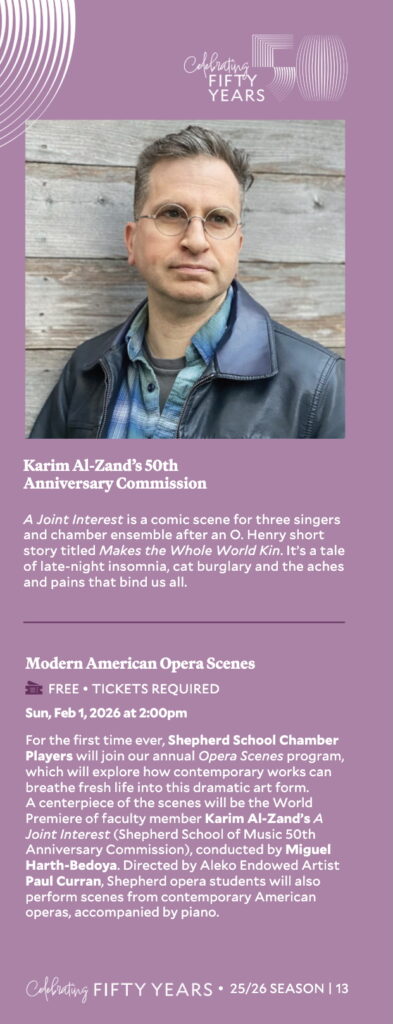 A Joint Interest was commissioned by the Shepherd School of Music on the occasion of its 50th anniversary. The libretto is a modern re-telling of O. Henry’s “Makes the Whole World Kin,” a classic yarn from America’s beloved short-story writer. A chamber opera buffa, A Joint Interest is a comic scene of late-night insomnia, cat burglary, and the aches and pains that bind us all. The performance, led by Director of Orchestras, Miguel Harth-Bedoya, Professor of Opera Studies, Joshua Winograde, director Paul Curran, and a stellar cast of student singers and instrumentalists, will have its premiere Sunday February 1st on the Shepherd School’s stunning Morrison Theater stage.
A Joint Interest was commissioned by the Shepherd School of Music on the occasion of its 50th anniversary. The libretto is a modern re-telling of O. Henry’s “Makes the Whole World Kin,” a classic yarn from America’s beloved short-story writer. A chamber opera buffa, A Joint Interest is a comic scene of late-night insomnia, cat burglary, and the aches and pains that bind us all. The performance, led by Director of Orchestras, Miguel Harth-Bedoya, Professor of Opera Studies, Joshua Winograde, director Paul Curran, and a stellar cast of student singers and instrumentalists, will have its premiere Sunday February 1st on the Shepherd School’s stunning Morrison Theater stage.
“The burglar stepped inside the window quickly, and then he took his time. A burglar who respects his art always takes his time before taking anything else.” O. Henry (Makes the Whole World Kin)
A complete list of 2025-2026 season performances can be found in the events listing.
Banff Interplay Opera Workshop
- On July 30, 2025
- By alzand@rice.edu
- In EVENTS, News
 0
0
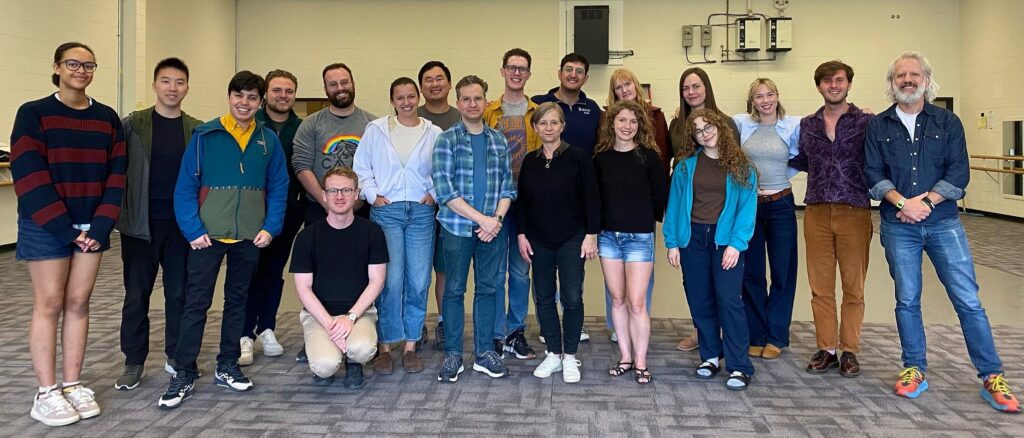 The 2025 Interplay program at the Banff Centre for Arts and Creativity showcases young singers and instrumentalists in both opera and chamber music performance. Their July 27th show, “An Evening with Karim Al-Zand” followed two weeks of rehearsals and workshops on new scenes, songs and other vocal music. The concert included workshop performances of The Strangers’ Case, A Joint Interest and two scenes from the forthcoming opera project The Book of Tales, plus select solo songs. [Preview from Winnipeg’s Classic 107.] The artists were guided in the workshops by a range of faculty including director Joel Ivany, conductor Sandra Horst and pianist Spencer Kryzanowski.
The 2025 Interplay program at the Banff Centre for Arts and Creativity showcases young singers and instrumentalists in both opera and chamber music performance. Their July 27th show, “An Evening with Karim Al-Zand” followed two weeks of rehearsals and workshops on new scenes, songs and other vocal music. The concert included workshop performances of The Strangers’ Case, A Joint Interest and two scenes from the forthcoming opera project The Book of Tales, plus select solo songs. [Preview from Winnipeg’s Classic 107.] The artists were guided in the workshops by a range of faculty including director Joel Ivany, conductor Sandra Horst and pianist Spencer Kryzanowski.
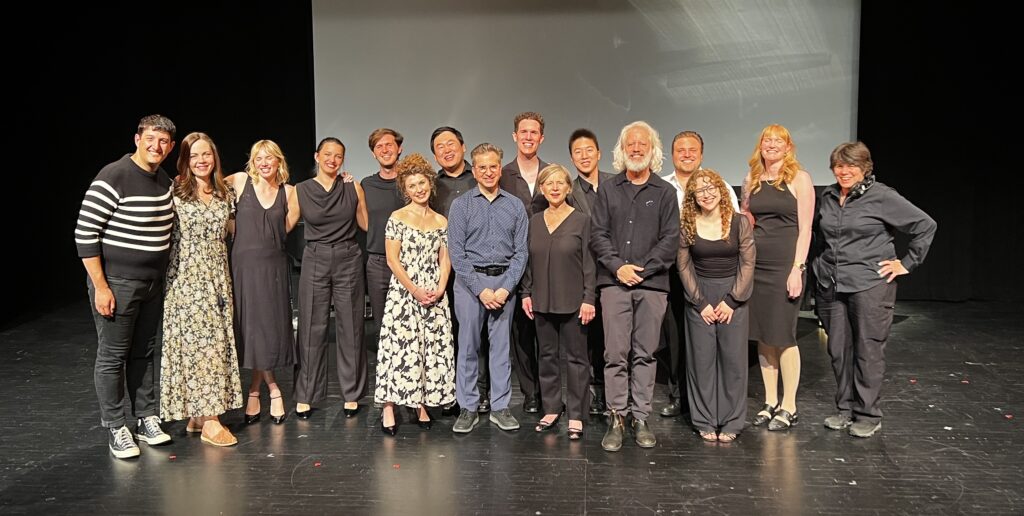
New Film of The Prisoner featuring Christopher Bozeka
- On June 18, 2025
- By alzand@rice.edu
- In News, Performances
 0
0
From an April 2025 Musiqa presentation of The Prisoner, in a new chamber transcription featuring tenor Christopher Bozeka, and conducted by Emily Senturia. Film by Full Media Jacket
CBC Radio Canada Feature: The Revelation Hour
- On June 10, 2025
- By alzand@rice.edu
- In News, Reviews/Press
 0
0
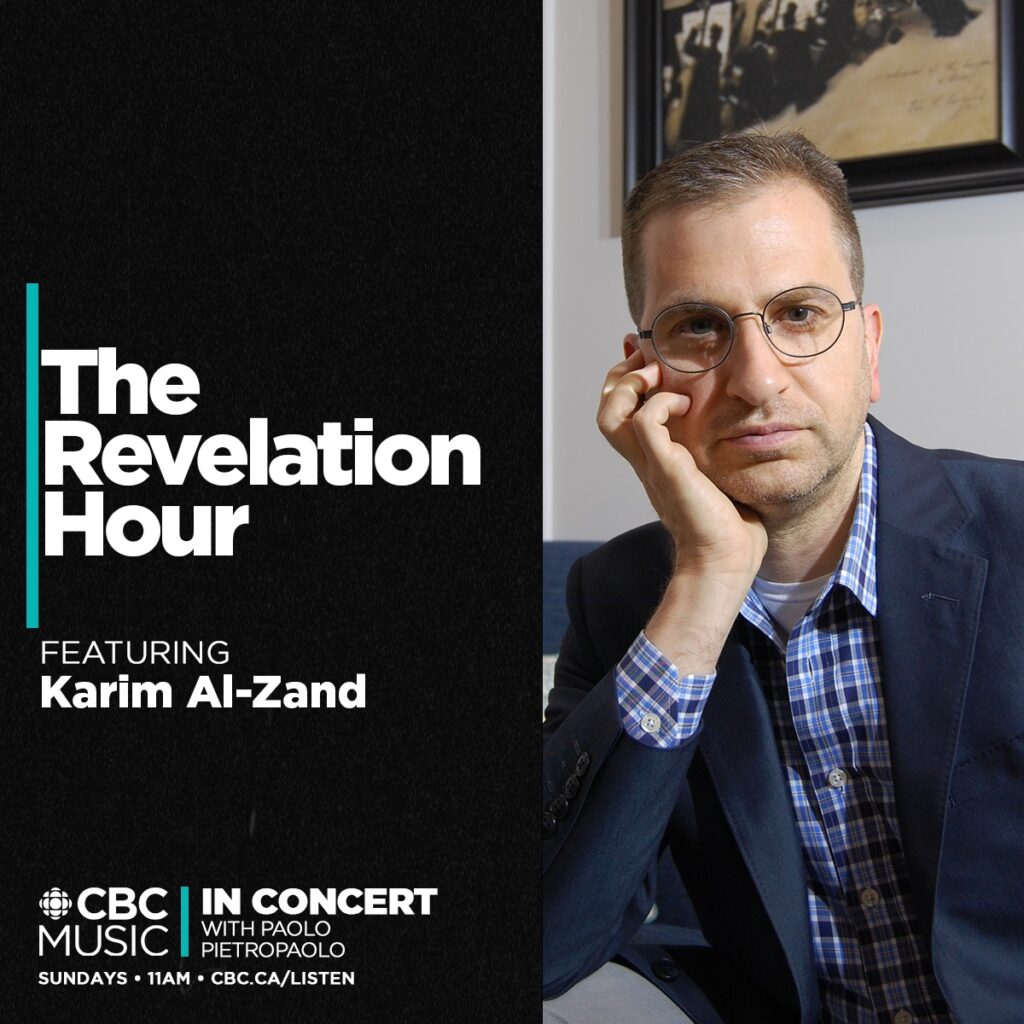 The June 7-8th edition of CBC Radio Canada’s In Concert, broadcast nationally and hosted by Paolo Pietropaolo, will include a feature on my music as its The Revelation Hour. Now available free on demand. The broadcast includes performances of Six Bagatelles, Visions from Another World, Paganini Reverie and Al Hakawati.
The June 7-8th edition of CBC Radio Canada’s In Concert, broadcast nationally and hosted by Paolo Pietropaolo, will include a feature on my music as its The Revelation Hour. Now available free on demand. The broadcast includes performances of Six Bagatelles, Visions from Another World, Paganini Reverie and Al Hakawati.
Musiqa Welcomes New Board Member Maiko Sasaki
- On June 10, 2025
- By alzand@rice.edu
- In Musiqa, News, Reviews/Press
 0
0
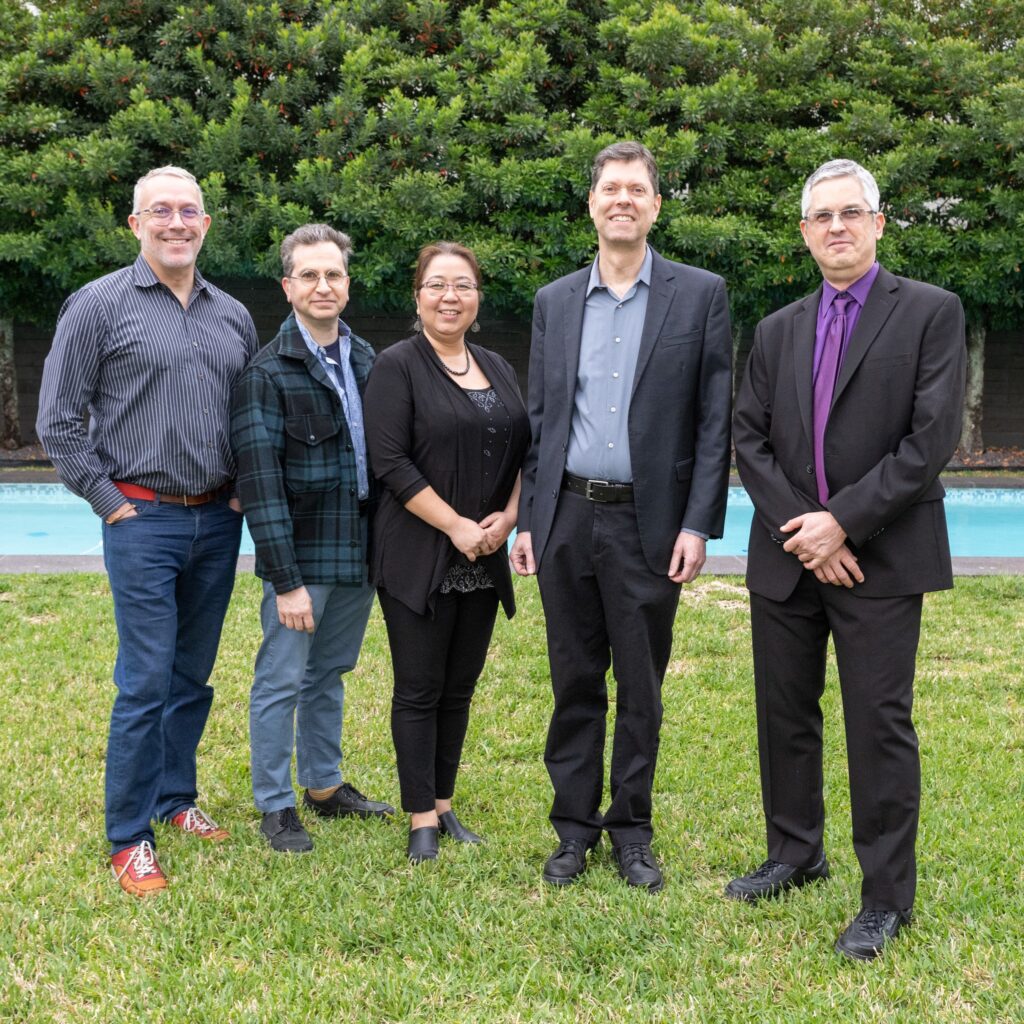 Musiqa Artistic Board (L to R): Marcus Maroney, Karim Al-Zand, Maiko Sasaki, Pierre Jalbert, Anthony BrandtMusiqa is proud to welcome Maiko Sasaki to our artist board! Maiko is a distinguished clarinetist known for her dynamic performances as a soloist, chamber musician, and orchestral player. A regular performer onstage with Musiqa, she joins founding artist board members Karim Al-Zand, Anthony Brandt, Pierre Jalbert and Marcus Karl Maroney in their ongoing quest to bring adventurous and inspiring programming to our audiences.
Musiqa Artistic Board (L to R): Marcus Maroney, Karim Al-Zand, Maiko Sasaki, Pierre Jalbert, Anthony BrandtMusiqa is proud to welcome Maiko Sasaki to our artist board! Maiko is a distinguished clarinetist known for her dynamic performances as a soloist, chamber musician, and orchestral player. A regular performer onstage with Musiqa, she joins founding artist board members Karim Al-Zand, Anthony Brandt, Pierre Jalbert and Marcus Karl Maroney in their ongoing quest to bring adventurous and inspiring programming to our audiences.
Houston Symphony Releases Film of Al Jazari’s Ingenious Clocks
- On June 10, 2025
- By alzand@rice.edu
- In News, Performances
 0
0
The Houston Symphony Orchestra has released the March 15, 2025 livestream premiere of Al Jazari’s Ingenious Clocks, led by music director Juraj Valčuha.
Moveable Do podcast interview
- On December 07, 2024
- By alzand@rice.edu
- In News, Reviews/Press
 0
0
An interview from the most recent episode of Moveable Do podcast, hosted by Steve Danielson.
Al Hakawati concert film released
- On December 07, 2024
- By alzand@rice.edu
- In EVENTS, News
 0
0
WDR Sinfonieorchester Köln has just released a concert film of the September 21st European premiere of Al Hakawati (The Story Teller), featuring Miriam Khalil, and conducted by music director Cristian Măcelaru. The work is a co-commission of the Cabrillo Festival of Contemporary Music, WDR Sinfonieorchester Köln and Orchestre National de France.
Al Hakawati presents fragments from an opera-in-progress entitled The Book of Tales. The opera is inspired by a recent discovery about a beloved story collection: the so-called “Arabian Nights.” The exact provenance of these medieval Arabic tales—properly known as Alf Laylah wa-Laylah (One Thousand and One Nights)—has always been something of a mystery. That all changed in 1993 when a forgotten 18th century Arabic manuscript was found in the Vatican library. It was a travel memoir written by a 75-year-old Syrian storyteller named Hanna Diyab. It recounts how, as a young man in 1707, the young Diyab had embarked on an extraordinary, years-long journey to Europe. His incredible adventures culminated in a meeting with the Sun King, King Louis XIV, in the halls of Versailles. Diyab told entrancing stories to everyone he met in his travels, including to Antoine Galland, a translator and archaeologist in Paris. It was Galland who, in 1710, first introduced Western readers to the stories of Ali Baba and Aladdin in Les Mille et une Nuits—though Galland makes no mention of Diyab. The storyteller returned to Aleppo in 1709 and eventually became a successful cloth merchant. He seems to have had no idea how far his captivating stories had travelled.
The opera connects stories and storytellers across time and place: from the present day, to the Ancien Régime of France, to the imaginary world of Scheherazade. The fragments in Al Hakawati comprise four “scenes” that feature the opera’s principal female characters.
1. I shiver, I tremble
The famed storyteller Scheherazade contemplates her precarious circumstances: each night she tells stories to the murderous Shahryar to postpone her execution.
I shiver, I tremble,
Trapped in a story of woe.
Frightening and violent.
Beyond these walls, this sky,
Another storyteller wanders free.
I would dance with her, my sister,
As the world shares her stories.
A different time, and place,
Another hakawati gathers friends.
I would sing with him, my brother,
As the world shares his stories.
Worlds interwoven with words and wishes.
Another Scheherazade, from afar.
I shiver, I tremble,
Trapped in a story of woe.
Frightened, but not silent.
2. He sleeps, this one
Shahryar is finally asleep. Consumed with fury, Scheherazade prepares to set his bed alight.
He sleeps, this one…
Sleeps the sleep of cruelest kings,
and of wickedness;
a callous and cold sleep, deep.
I seethe, inside…
Seethe with rage that terror brings,
and its bitterness;
with each breath left to breathe, seethe.
I can no longer weep.
The wound is too deep.
Sleep! In a burning keep!
Sleep! Sleep! The righteous flames will leap!
3. Dance of the seven swords (orchestra)
Murjana dances for her husband, Ali Baba, and a visiting merchant. She alone has discerned their guest’s true identity: he is Nadir, the leader of a band of thieves. He plans to kill her witless husband, who has foolishly stolen their treasure. At the climax of the dance she dispatches the villain.
4. For all I know
Tarina Safar, a modern-day scholar of medieval Arabic, has discovered Hanna Diyab’s manuscript in the Vatican library. She marvels at the power of stories and of storytellers.*
For all I know,
a story has wings, that it might soar—
fledged in a mind,
flying from our lips,
flocking to eager ears,
to open our dreaming eyes—
homing to our hearts.
Swirling stories—in droves they take a murmuring shape,
in forms that scrape the drawn dawn—
tracing a truth in the sky.
نبي الشعب
لعنة الملوك
حكواتي حكواتي
اشرح لنا حكمة الاشياء
For all I know,
a tale is a pilgrim, that it might journey—
migrating from world to world,
message in its satchel,
moving through ages,
arriving here—
to camp in our hearts.
Traveling tales—a caravan with load of amber,
flutes and tambour the dawn down—
leaving lessons in the sand.
Hakawati, teller of tales:
the people’s prophet,
the curse of kings.
Hakawati, Hakawati!
Show us the wisdom of things!
*Safar’s character is fictional, but she is inspired by the American scholar of Islam, Nabia Abbott (1897–1981), the first female professor at the University of Chicago’s Oriental Institute. Abbott did some of the earliest research into the origins of the Thousand and One Nights.
Cinderella presented at Miller Outdoor Theater
- On October 20, 2024
- By alzand@rice.edu
- In Musiqa, News
 0
0
Musiqa had its debut at Houston’s iconic Miller Outdoor Theater, with a characteristic program of inter-arts works. The evening program included a presentation of Lotte Reiniger’s 1922 silent silhouette film, Cinderella, with live music, conducted by Yue Bao. 
Al Hakawati Receives European Première
- On October 01, 2024
- By alzand@rice.edu
- In EVENTS, News, Reviews/Press
 0
0
Al Hakawati received its European premiere on September 22 at the Kölner Philharmonie, in a performance by soprano Miriam Khalil and the WDR Symphony Orchestra, under the direction of Cristian Măcelaru. Also on the program was Shostakovich’s Cello Concerto No.1 ( Sheku Kanneh-Mason), and Rimsky Korsakov’s Scheherazade, Op. 35. Al Hakawati is a co-commission of the Cabrillo Festival of Contemporary Music, WDR Sinfonieorchester Köln and the Orchestre National de France.
Al Hakawati (The Storyteller) presents fragments from an opera-in-progress entitled The Book of Tales. The opera is inspired by a recent discovery about a beloved story collection, the so-called “Arabian Nights.” The exact provenance of these medieval Arabic tales, properly known as Alf Laylah wa-Laylah [One Thousand and One Nights], has always been something of a mystery. That all changed in 1993 when a forgotten 18th century Arabic manuscript was found in the Vatican library. It was a travel memoir written by a 75-year-old Syrian storyteller named Hanna Diyab. In 1707, the young Diyab had embarked on an extraordinary, years-long journey to Europe. His incredible adventures culminated in a meeting with the Sun King, King Louis XIV, in the halls of Versailles. Diyab told his entrancing stories to everyone he met in his travels, including to Antoine Galland, a translator and archaeologist in Paris. It was Galland who, in 1710, first introduced Western readers to the stories of Ali Baba and Aladdin in Les Mille et une Nuits—though Galland makes no mention of the storyteller. Diyab returned to Syria in 1709 and eventually became a successful cloth merchant in Aleppo.
He seems to have had no idea how far his captivating stories had travelled.
The opera connects stories and storytellers across time and place: from the present day, to the Ancien Régime of France, to the imaginary world of Scheherazade. And, though the “frame story” is Diyab’s, the most significant characters in the story are women. The fragments in Al Hakawati comprise four “scenes” that feature the opera’s three principal female characters.
Al Hakawati Premiered at 2024 Cabrillo Festival of Contemporary Music
- On August 30, 2024
- By alzand@rice.edu
- In EVENTS, News
 0
0
Al Hakawati, a new work for soprano and orchestra received its premiere on August 2nd in Santa Cruz, CA at the 2024 Cabrillo Festival of Contemporary Music, with soprano Miriam Khalil and conductor Cristian Mӑcelaru. The work will be repeated on September 21 by the WDR Sinfonieorchester Köln in Germany. The work is a co-commission of Cabrillo, WDR and l’Orchestre National de France (who will do the work in 2026).
Al Hakawati (The Storyteller) presents fragments from an opera-in-progress entitled The Book of Tales. The opera is inspired by a recent discovery about a beloved story collection, the so-called “Arabian Nights.” The exact provenance of these medieval Arabic tales, properly known as Alf Laylah wa-Laylah [One Thousand and One Nights], has always been something of a mystery. That all changed in 1993 when a forgotten 18th century Arabic manuscript was found in the Vatican library. It was a travel memoir written by a 75-year-old Syrian storyteller named Hanna Diyab. In 1707, the young Diyab had embarked on an extraordinary, years-long journey to Europe. His incredible adventures culminated in a meeting with the Sun King, King Louis XIV, in the halls of Versailles. Diyab told his entrancing stories to everyone he met in his travels, including to Antoine Galland, a translator and archaeologist in Paris. It was Galland who, in 1710, first introduced Western readers to the stories of Ali Baba and Aladdin in Les Mille et une Nuits—though Galland makes no mention of the storyteller. Diyab returned to Syria in 1709 and eventually became a successful cloth merchant in Aleppo.He seems to have had no idea how far his captivating stories had travelled.
The opera connects stories and storytellers across time and place: from the present day, to the Ancien Régime of France, to the imaginary world of Scheherazade. And, though the “frame story” is Diyab’s, the most significant characters in the story are women. The fragments in Al Hakawati comprise four “scenes” that feature the opera’s three principal female characters.
2024 Barlow Prize
- On August 30, 2024
- By alzand@rice.edu
- In News, Reviews/Press
 0
0
 The Barlow Endowment for Music Composition at Brigham Young University proudly announces the Barlow Prize recipient for 2024.
The Barlow Endowment for Music Composition at Brigham Young University proudly announces the Barlow Prize recipient for 2024.
After reviewing 384 submissions from 47 countries, the judging panel awarded Karim Al-Zand the $15,000 Barlow Prize to compose a major new work for organ, to be premiered by a consortium of performers which will include Chelsea Chen,  Don Cook, Janette Fishell, and Bradley Hunter Welch.
Don Cook, Janette Fishell, and Bradley Hunter Welch.
Known for his “strong and startlingly lovely” music (Boston Globe), Canadian-American composer Karim Al-Zand’s compositions span a wide range of influences and inspirations. His diverse portfolio includes solo, chamber, vocal, and orchestral works that draw from a rich tapestry of sources such as graphic art, myths, world folk music, and his Middle Eastern heritage. With accolades including the ArtSong Prize and the Arts and Letters Award in Music, Al-Zand’s innovative compositions continue to leave a significant mark internationally. A founding member of Musiqa, Houston’s premier contemporary music group, Al-Zand is a Professor of Composition and Theory at Rice University’s Shepherd School of Music.
Al Hakawati preview
- On August 05, 2024
- By alzand@rice.edu
- In EVENTS, News, Uncategorized
 0
0
I recently spoke to Jeff Kaliss of The San Francisco Classical Voice about the premiere performance of Al Hakawati at the Cabrillo Festival of Contemporary Music.
Al Hakawati @ Cabrillo Preview
- On July 22, 2024
- By alzand@rice.edu
- In EVENTS, News
 0
0
I Care If You Listen previews the Cabrillo Festival of Contemporary Music summer 2024 schedule, which includes the premiere of Al Hakawati. Co-Commissioned by Cabrillo, WDR Sinfonieorchester Köln & Orchestre National de France, the work was written for Canadian soprano Miriam Khalil and conductor by Cristian Măcelaru and will receive its premiere at the festival on its opening concert Friday August 2nd.
Al Hakawati co-commissioned by Cabrillo Festival, WDR Sinfonieorchester Köln & Orchestre National de France
- On May 08, 2024
- By alzand@rice.edu
- In EVENTS, News
 0
0
A new work for soprano and orchestra Al Hakawati, co-commissioned by the Cabrillo Festival of Contemporary Music, WDR Sinfonieorchester Köln & Orchestre National de France will premiere next season, with Canadian soprano Miriam Khalil and conductor by Cristian Măcelaru. The work will receive its premiere at the Cabrillo Festival of Contemporary Music on August 2nd. A second performance with WDR Sinfonieorchester Köln is scheduled for September 21, with a following performance in Paris, TBA.
Al Hakawati (The Storyteller) presents fragments from an opera-in-progress entitled The Book of Tales. The opera is inspired by a recent discovery about a beloved story collection, the so-called “Arabian Nights.” The exact provenance of these medieval Arabic tales, properly known as Alf Laylah wa-Laylah [One Thousand and One Nights], has always been something of a mystery. That all changed in 1993 when a forgotten 18th century Arabic manuscript was found in the Vatican library. It was a travel memoir written by a 75-year-old Syrian storyteller named Hanna Diyab. In 1707, the young Diyab had embarked on an extraordinary, years-long journey to Europe. His incredible adventures culminated in a meeting with the Sun King, King Louis XIV, in the halls of Versailles. Diyab told his entrancing stories to everyone he met in his travels, including to Antoine Galland, a translator and archaeologist in Paris. It was Galland who, in 1710, first introduced Western readers to the stories of Ali Baba and Aladdin in Les Mille et une Nuits—though Galland makes no mention of the storyteller. Diyab returned to Syria in 1709 and eventually became a successful cloth merchant in Aleppo. He seems to have had no idea how far his captivating stories had travelled.
The opera connects stories and storytellers across time and place: from the present day, to the Ancien Régime of France, to the imaginary world of Scheherazade. And, though the “frame story” is Diyab’s, the most significant characters in the story are women. The fragments in Al Hakawati comprise four “scenes” that feature the opera’s three principal female characters.
1. I shiver, I tremble
The famed storyteller Scheherazade contemplates her precarious circumstances: each night she tells stories to the murderous Shahryar to postpone her execution.
2. He sleeps, this one
Shahryar is finally asleep. Consumed with fury, Scheherazade prepares to set his bed alight.
3. Dance of the seven swords (orchestra)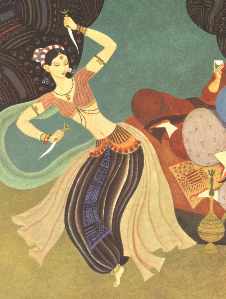
Murjana dances for her husband, Ali Baba, and a visiting merchant. She alone has discerned their guest’s true intent: he plans to kill her witless husband, who has foolishly stolen treasure from a band of thieves. At the dance’s climax she dispatches the villain.
4. For all I know
Tarina Safar*, a modern-day scholar of medieval Arabic, has discovered Hanna Diyab’s manuscript in the Vatican library. She marvels at the power of stories and of storytellers.
* Safar’s character is fictional, but she is inspired by the American scholar of Islam, Nabia Abbott (1897–1981), the first female professor at the University of Chicago’s Oriental Institute. Abbott discovered some of the earliest known fragments from the Thousand and One Nights.
Houston Symphony Orchestra commissions new work for 24-25 season
- On May 08, 2024
- By alzand@rice.edu
- In EVENTS, News
 0
0
Al-Jazari’s Ingenious Clocks is inspired by the fantastical inventions of 12th century Islamic polymath Ismail al-Jazari: scholar, inventor, engineer, artist and mathematician. His remarkable treatise, “The Book of Knowledge of Ingenious Mechanical Devices,” describes fifty machines he engineered to perform various tasks. Coupled with his own colorful illustrations, the fountain, a band of mechanical musicians, a hydraulic “perpetual flute,” a self-cleaning washbasin, and a mechanized“butler” who prepares drinks. book evokes a fairy-tale world of automated devices: a dancing water 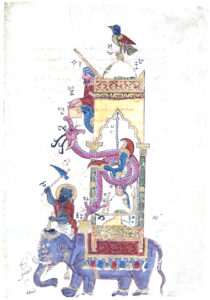 Known as the “father of robotics” for his revolutionary work in engineering and automation, al-Jazari’s devices are fascinating both functionally and aesthetically.
Known as the “father of robotics” for his revolutionary work in engineering and automation, al-Jazari’s devices are fascinating both functionally and aesthetically.
But perhaps his most beautiful and captivating designs are his many mechanical clocks. These include elaborate candle clocks (triggered by dripping wax), an astronomical “castle clock,” a programmable clock of mechanical drummers (who beat out the hours!), a portable “scribe clock” and a giant “elephant clock” (at right).
Al-Jazari’s Ingenious Clocks is an evocative time piece, a musical journey to a vivid world of invention and imagination. It captures the vision and whimsy of these enchanting time machines, built with a prescience that anticipates our automated modern world.

